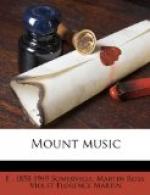“It’s burnt down,” said Christian, hurriedly. Something in her face checked Larry’s exclamation. In Ireland people learn to be silent on a very imperceptible hint.
The farmers moved away. Said Michael Donovan in a low voice to John Kearney:
“Will she go back, d’ye think?”
“I d’no. Har’ly, I think!”
“It’d be a pity anything’d happen her. She’s a lovely girl to ride!”
“You may say that, Michael! The father gave her the sate, but it was the Lord Almighty gave her the hands!” said old Kearney, devoutly.
“Maybe He’ll mind her, so!” responded Michael Donovan, without irreverence.
The shifting of responsibility brought some ease of mind.
“God grant it!” said John Kearney.
Christian was ordinarily possessed of an innate reasonableness that responded to reason, but fear was not in her, and an appeal to reason was least potent with her when she was in the saddle. The veiled hints of danger, by which from, Evans onwards, she had been beset, only woke the spirit of revolt that slept in her but little less lightly than it had slept in her childhood, and were as fuel on the flame the run had kindled.
“Larry,” she said, with a light in her eyes, and a flush in her cheeks, “do you think I ought to go back?”
“Go back? Why should you?”
Larry, having received a hasty sketch of the position, gave his advice with all the assurance of complete ignorance. “Your father has the sporting rights—anyhow, I don’t believe they’ll stop you. Irishmen are—”
Dissertation as to what Irishmen were or were not, attractive though it was to a young man who knew nothing of the subject, was checked by the success of Bill Kirby’s cast ahead. Half way across the big field, the hounds, who had been industriously spreading themselves, and examining blades of grass and fronds of bracken with the intentness of botanists, came, with a sudden rush, to a deep note from old Bellman, and, as suddenly, broke into full-cry, with the unanimity of an orchestra when the baton comes down. They headed for “Carmody’s bounds,” and were over that solid barrier, and running hard across the succeeding field, before most of the riders had realised what had happened. The bounds fence was an honest jump—big, but safe. Nancy, at the heels of the bay horse, came up on to it with a perfection that banished all other thoughts from Christian’s mind. On the landing side, under the bank, was a strong-running stream, and two or three of the horses, at sight of it, checked on the wide top of the bank, and tried to turn. Not so Nancy. It was enough for her that her father by adoption had not hesitated. She slid her forefeet a little way down the grassy side and went out over the water as if the bank had been a springboard. It was only then, at the gorgeous moment of successful landing, that Christian was aware of a young man running towards the riders, bawling, and demonstrating with something that might be a gun.




